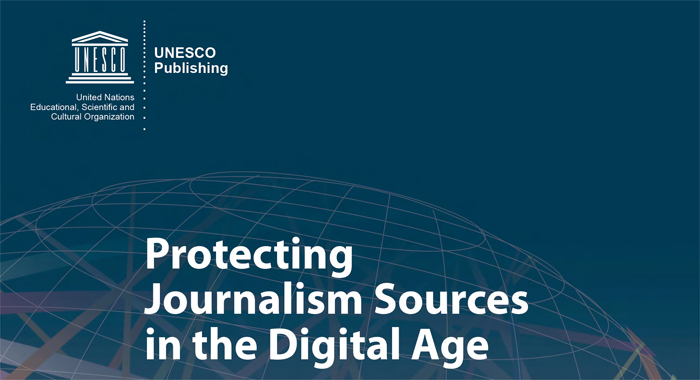by: Sam Berkhead
Investigative journalists rely on whistleblowers and confidential sources a great deal when seeking to expose corruption and abuses of power. But in the digital age, what legal safeguards exist to protect the privacy of journalists and their sources? How can we prevent these frameworks from deteriorating as press freedom declines around the world? What must journalists do to ensure their sources’ safety and confidentiality?
A new UNESCO study, “Protecting Journalism Sources in the Digital Age,” seeks the answers to these questions. Published to mark World Press Freedom Day, the study offers a far-reaching look at some of the most pressing challenges facing investigative journalists and whistleblowers.
Topics covered in the study include mass and targeted surveillance; the over-reach of anti-terrorism and national security legislation; and the outdated nature of analog-era legal frameworks supporting source protection.
“The principle and practice of source confidentiality, and the ability of whistleblowers to have confidence in the promise that journalists protect sources, are under increasing threat,” wrote Julie Posetti, study author and lead researcher. “Action is required urgently to address the problem and I hope that this study will assist in the process of raising awareness and prompting reform.”
The survey looked at data from 121 UNESCO member states between 2007 and 2015 to paint a picture of journalism source protection across the globe. Among its findings:
-
Legal protections for journalist’s sources are increasingly eroded by national security and anti-terrorism legislation
-
Mass and targeted surveillance continue to compromise confidentiality
-
Third-party platforms like social media and search engines can release sensitive data when pressured by authorities
-
Legal frameworks in many countries are increasingly outdated, often lacking regulations for the collection and use of digital data
When journalists and their sources don’t have adequate protections and source protection is compromised, a number of negative effects can take place. Cover-ups, intimidation, destruction of information, revelation of sources’ identities and self-censorship are all typical repercussions. The challenges faced by women journalists and whistleblowers alike are even more acute, from sexual harassment and assault to increased digital threats, the study notes.
Given these grim findings, what can be done to safeguard investigative reporters and the sources they rely on?
The study explains it will be increasingly essential for journalists to take proper precautions to protect their communications with sensitive sources. Governments everywhere will also need to implement transparency and accountability systems. The study provides an 11-step model legal source protection framework for legislators to consult while drafting new protections for journalists and their sources.
Click here to download the full study.
Source: ijnet.org





